A caretaker government is a temporary ad hoc government that performs some governmental duties and functions in a country until a regular government is elected or formed. Depending on specific practice, it consists of either randomly selected members of parliament or outgoing members until their dismissal.
The Eighth Amendment to the Constitution of Pakistan allowed the President to unilaterally dissolve the National Assembly and elected governments. The National Assembly of Pakistan amended the Constitution of Pakistan in 1985 and the law stayed on the books until its repeal in 1997.
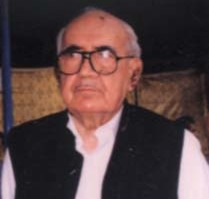
Ghulam Ishaq Khan, commonly known by his initials GIK, was a Pakistani bureaucrat, politician and statesman who served as the seventh president of Pakistan from 1988 to 1993. He previously served as Chairman of the Senate from 1985 to 1988 under president Muhammad Zia-ul-Haq, and was sworn in shortly after Zia's death.
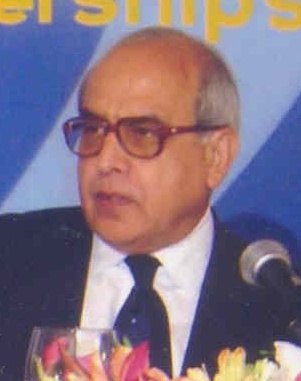
Farooq Ahmad Khan Leghari, was a Pakistani politician who served as the eighth president of Pakistan from 14 November 1993 until resigning on 2 December 1997. He was the first Baloch to be elected as President.

Moeenuddin Ahmad Qureshi was a Pakistani American economist and civil servant who served as caretaker prime minister of Pakistan from July to October 1993. Qureshi also served as the senior vice president of World Bank.

General Abdul Waheed KakarNI(M) HI(M) SBt, is a retired senior officer of the Pakistan Army who served as the ninth chief of army staff, appointed by Prime Minister Nawaz Sharif on 12 January 1993 upon death of his predecessor Asif Nawaz Janjua, he remained in office until retiring on 12 January 1996.
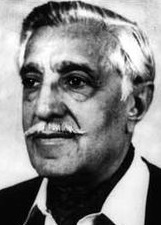
Sardar Mir Balakh Sher Mazari was a Pakistani politician who served as Caretaker Prime Minister of Pakistan for five weeks in 1993. He was the tumandar and the paramount sardar of the Mazari tribe which is situated on the tristate area between Balochistan, Sindh, and Punjab provinces of Pakistan.

Shahid Khaqan Abbasi is a Pakistani politician and businessman who served as the 21st prime minister of Pakistan from August 2017 to May 2018. Abbasi was the senior vice President of the Pakistan Muslim League-N (PML-N), and had been the secretary-general of Pakistan Democratic Movement (PDM), an anti-PTI coalition of political parties in Pakistan. He had been a Member of the National Assembly of Pakistan from October 2018 to August 2023 and previously served as a member of the National Assembly for 8 non-consecutive terms since 1988.
The Pakistan coup attempt of 1995 or Operation Khalifa was a secretive plot hatched by renegade military officers and against the government of Benazir Bhutto, the prime minister of Pakistan. The plotters aimed to overthrow the constitutional government and establish military rule in Pakistan. The plot was foiled after intelligence agencies tipped off the Pakistan Army. Despite the failure, the coup attempt would weaken Bhutto's government considerably in the aftermath.
The year 1993 saw political unrest within Pakistan as president Ghulam Ishaq Khan and prime minister Nawaz Sharif duelled for supremacy. Khan dissolved Sharif's government, only for it to be restored by a Supreme Court verdict.
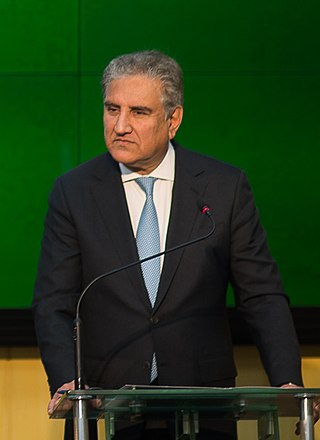
Makhdoom Shah Mahmood Hussain Qureshi is a Pakistani politician who served as the 29th Minister of Foreign Affairs from 2018 to 2022. He previously held the post from 2008 to 2011. He had been a member of the National Assembly from August 2018 till January 2023. He is the vice chairman of the Pakistan Tehreek-e-Insaf political party since December 2011. Previously, he was a member of the National Assembly from 2002 to May 2018.

General elections were held in Pakistan on 6 October 1993 to elect the members of National Assembly. The elections took place after both the Prime Minister Nawaz Sharif and President Ghulam Ishaq Khan resigned to resolve a power struggle.
The Mazari caretaker ministry under Balakh Sher Mazari as the caretaker prime minister of Pakistan was sworn into office after the Nawaz government was overthrown on 19 April 1993 by president Ghulam Ishaq Khan. Mazari's tenure as caretaker prime minister ended abruptly on 26 May 1993 when the Supreme Court revoked the presidential order and reinstated Nawaz Sharif as the prime minister.
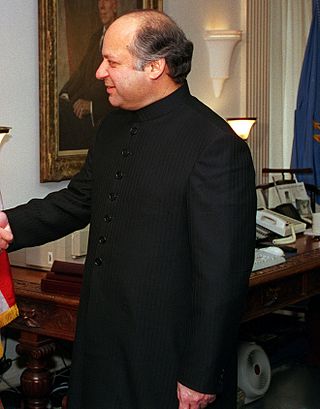
The first Nawaz Sharif government under prime minister Nawaz Sharif was sworn into office on 9 November 1990, after the nine-party Islami Jamhoori Ittehad (IJI) unanimously nominated him the government head.
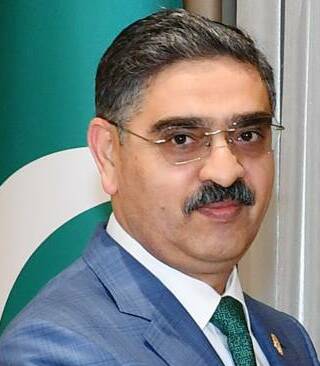
Anwaar-ul-Haq Kakar is a Pakistani politician who served as the longest-serving caretaker prime minister of Pakistan between 14 August 2023 and 4 March 2024. He was succeeded by his predecessor Shehbaz Sharif. He assumed membership in the Upper House of Pakistan in March 2018. Before taking on the role of caretaker prime minister, Kakar had resigned from the upper house of parliament. Subsequently, he publicly declared his resignation from both the Senate and the Balochistan Awami Party (BAP), a political party he established in 2018.

After the 2024 general elections in Pakistan, Shahbaz Sharif's second ministry was formed. Shehbaz Sharif from the Pakistan Muslim League-N was elected as the Prime Minister. President Asif Ali Zardari took the oath of office. The new Cabinet composition has been described as a "Lean", with its composition being influenced by the need of the new government to respond quickly to the current economic crisis. The Cabinet includes PML-N, MQM(P), PML(Q), IPP and independents.
Ahad Khan Cheema is a retired Pakistani bureaucrat who is the current Federal Minister of Economic Affairs, appointed on 11 March 2024. Previously, he has served as a chief executive officer (CEO) of the Quaid-e-Azam Thermal Power Company and director-general of the Lahore Development Authority. In 2018, the National Accountability Bureau (NAB) arrested Cheema on charges related to irregularities in the Ashiana Housing Scheme project during his time as chairman of the LDA. The investigation also involved former Prime Minister Nawaz Sharif's principal secretary Fawad Hassan Fawad and Shehbaz Sharif. Cheema was released on bail in 2021 after spending three years in jail and was acquitted of all charges by the NAB in 2023. He took retirement from civil service in January 2023.

The first Benazir Bhutto government was formed on 2 December, 1988 following general elections held in 1988. Due to the PPP only securing a plurality, the new government forged a coalition alliance with the MQM, ANP, JUI(FR) and other additional independents. Following elections President Ghulam Ishaq Khan called upon Benazir Bhutto, later announcing the formation of a new government. Benazir promised while taking oath on 2 December to eradicate illiteracy, poverty, restore student unions, liberate political prisoners, provide equal rights to women and free the media. However, the Army's continued influence and lack of a legislative majority led to her later declaring her government's freedom of action was "institutionally, economically, politically (and) structurally" constrained. Later during Presidential elections the same year, Benazir Bhutto solidified her alliance with President Ishaq Khan through supporting his bid for re-election. However later the two came into conflict, over the division of powers between the two offices and as the President continued to support Bhutto's opponent Nawaz Sharif. Eventually on 6 August, 1990 Ghulam Ishaq Khan issued an order under Article 58(2)(b) dissolving the National Assembly causing the Prime Minister and the cabinet to cease holding office. The stated charges of dismissal for the Bhutto government were corruption and the deteriorating law and order situation in Sindh.

The Jatoi caretaker government was the first caretaker government in Pakistan from 6 August 1990 to 6 November 1990. Ghulam Mustafa Jatoi acted as the first caretaker Prime Minister of Pakistan. The Jatoi government was appointed by Ghulam Ishaq Khan, who was president, after he dissolved the National Assembly and the PPP Bhutto government in August of the same year. Jatoi previously served as leader of the opposition in the assembly, whilst other caretaker ministers were selected based on their opposition to the PPP. Jatoi himself was a former Pakistan People's Party member who formed his own rival National Peoples Party (NPP) after a dispute with Benazir Bhutto. The caretaker government consisted of anti-PPP ministers in the provinces as-well. Ghulam Haider Wyne, an ally of Nawaz Sharif, was caretaker CM while in Sindh, caretaker CM Jam Sadiq Ali also opposed the PPP. Later Jam Sadiq Ali continued in office as Chief Minister following elections.












